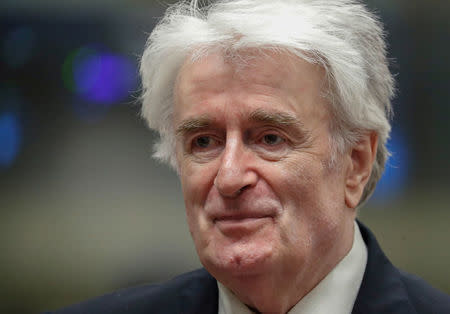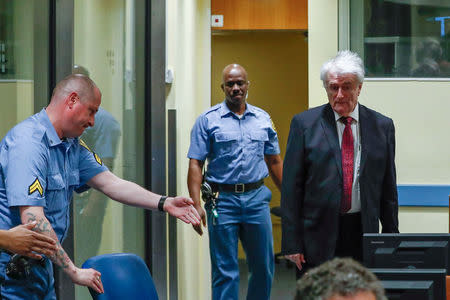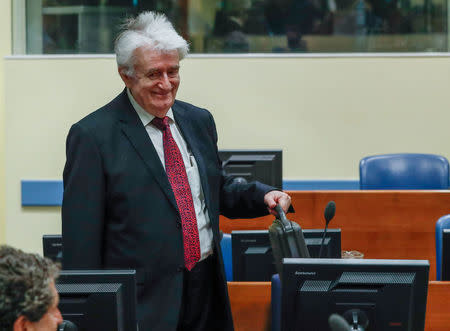Ex-Bosnian Serb leader Karadzic accuses prosecutors of twisting his words
By Stephanie van den Berg
THE HAGUE (Reuters) - Former Bosnian Serb leader Radovan Karadzic asked U.N. judges on Monday to overturn his genocide conviction, accusing prosecutors of unfairly blackening his name and twisting his words at his trial.
Karadzic was convicted two years ago for some of the worst war crimes committed as the former Yugoslavia broke apart in the 1990s, including the 1995 Srebrenica massacre in which around 8,000 Bosnian Muslim men and boys were killed.
He is asking judges overseeing his appeal to overturn the 40-year jail sentence imposed and order a re-trial.
A group of victims from the 'Bosnian Mothers of Srebrenica' organisation watched as Karadzic, 72, looking healthy and resolute in a grey suit and red tie, take the floor on the first of the two-day appeal hearing.
Arguing prosecutors had sought to misrepresent him by taking his words out of context, Karadzic said that when he had spoken in 1992 of Bosnian Muslims finding themselves on a "highway to hell" he had not intended this as a threat as they implied.
They had misinterpreted him "to blacken me and portray me as a person only concerned with my own people", he told the court. His comment had instead been "a plea and a warning that we might be led into war" by Bosnia's decision to secede.
His comments drew whispers of "liar, liar" from victims in the courtroom.
RETRIAL CALL
Munira Subasic, who lost a son and a husband in the massacre, said Karadzic should be given a life sentence.
"If it is not a life sentence it is not a punishment ... Everyone who committed crimes should be punished to ensure a better future not for us mothers but for our grandchildren and his grandchildren," Subasic said.
"We are here today to ask you to overturn Radovan Karadzic’s conviction and order a new trial," defence lawyer Peter Robinson told the panel of UN judges.
Karadzic, who was arrested a decade ago after a years-long manhunt, was found guilty on 10 counts of genocide, war crimes and crimes against humanity for the brutal campaign of ethnic cleansing in Bosnia which he oversaw as president of the breakaway Bosnian Serb Republic.
But his lawyer described the initial seven-year trial as an "out-of-control mega-trial" which they said violated his rights to a fair hearing.
Karadzic also contested the charge that he supported the shelling of civilians during the 44-month siege of Sarajevo, his lawyer told the court.
Karadzic's conviction was handed down by U.N. judges at the International Criminal Tribunal for the former Yugoslavia (ICTY) which said he was "at the apex of power" of the Bosnian Serb military and political hierarchy when atrocities were committed by his troops.
The appeals hearing is being held at the International Residual Mechanism for Criminal Tribunals (MICT), which is handling outstanding U.N. war crimes cases for the Balkans and Rwanda.
After Karadzic, prosecutors will set out their own appeal against Karadzic’s acquittal on a second count of genocide in various towns across Bosnia during the war of the 1990s. They will seek a life sentence on that count.
A final verdict on Karadzic's appeal is expected by the end of the year.
(Reporting by Stephanie van den Berg; Writing by Anthony Deutsch; Editing by Richard Balmforth)

 Yahoo News
Yahoo News 





